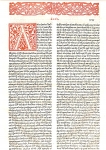Blogroll
Topics

Stanford University Libraries is the grateful recipient of a very generous donation of some 700 individual leaves from early printed books, the gift of Donn Faber Downing and Letitia Leigh Sanders. The vast majority of these leaves are from books from the 15th and 16th centuries and serve not only as examples of which texts were being printed with this “new” technology (Gutenberg’s Bible was printed about 1455, the first book printed in the western world with moveable type) but also how these texts were presented: their typefaces, page layout, and format. It is a remarkable, rich collection, and will be used in a wide variety of classes.
For the devotees of early printing, all the most recognized names in printing are represented: Johann Mentelin’s printing of Augustine’s De Civitate Dei (1468), Gunther Zainer’s edition of Isidore of Seville (1472), the Sweynheym and Pannartz printing of Nicholas of Lyra’s Postilla super Totam Bibliam (1472), Nicolas Jenson’s printing of the Bible (1479), leaves from different works produced by Anton Koberger, the great printer of Nuremberg, most famous for producing the magnificent Nuremburg Chronicle (a Latin and a German edition each appearing first in 1493), and many leaves from the different productions of Aldus Manutius, perhaps the most celebrated printer of the Renaissance. All of these examples from these famous printers serve to deepen our knowledge and understanding (and appreciation) of just how remarkable this enterprise—printing—was and would be. Many of these leaves are from books so rare that copies of them may not come on the market again; and if they did, their price could strain a library’s budget past the breaking point.
These leaves from books produced by famous printers make this collection a most welcome one, but the collection in fact offers far more: hundreds of leaves by less well-known printers, printers and texts that give us a more accurate sense of what was being produced in what some have referred to as the “printing revolution.” Johnann Sensenschmidt of Nuremberg, Johann Schussler of Augsburg, Leonhard Auri of Venice, and Konrad Fryner of Esslingen are hardly household names, but all were printing in the 1470s, a scant few years after printing was introduced in Europe.
We see in these leaves not only the result of rendering texts into print, we see which texts were printed early on, an indication of what printers thought was important and what could sell. The usual suspects are here, of course: the Bible, Albertus Magnus, Augustine, Thomas Aquinas, Peter Lombard, and other authors who were so important in the history of western thought. Less well-known texts, however, abound: Paulus Maurocenus’ De Generatione Aeterna (1473), Leonardus de Utino’s Sermones de Sanctis (1474), Albertus Brixiensis’ De Arte Loquendi et Tacendi (1474), and Poggius Florentius’ Facetiae (1475), to name a few. Students handling these leaves will be seeing not just late medieval printing; they will likely be looking at a text previously unknown to them.
While these items are intellectually compelling in themselves, they will inevitably serve as catalysts for more research: who was this printer? When did printing begin in this certain city? Who was the author of the text, and why was the text considered important enough to put into print? How many copies were printed? Who was the intended audience? What was the history of the text in manuscript? What copies of manuscripts were used as exemplars for a printed edition? All of these questions on some level lie at the heart of the matter: how were networks of texts formed and nourished in the late medieval and early modern eras in Europe? This vast selection of early printed leaves yields many possibilities and answers.
We are extremely fortunate to have this collection here in Special Collections and are very grateful to Donn Downing and Letitia Sanders for this wonderful and generous gift.

Aldine Greek Bible, 1518

Leonardus de Utino, Sermones, 1473


 Stanford University Home
Stanford University Home